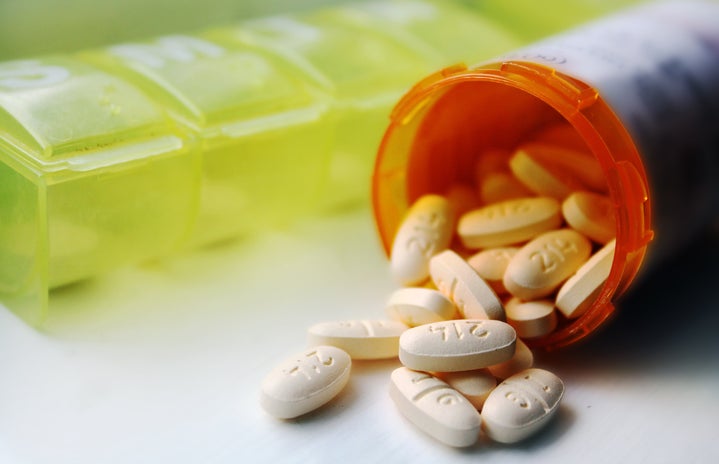In 2022, 107,375 people in the United States died of drug overdoses and poisonings, with 67% of them involving the synthetic opioid fentanyl. Public fear has heightened with fentanyl’s unique extreme potentness. Fentanyl overdoses often happen unintentionally through other drugs or drinks. The growing issue has made citizens hypervigilant and elected officials eager to combat it.
Only two milligrams of fentanyl are considered lethal, which is as small as the tip of a pencil. So even with the effort to make fentanyl testing strips widely available, a scrape of a pill on a testing strip may still not be enough to protect one from an overdose.
According to Anne Milgram, Administrator of the Drug Enforcement Administration, a fentanyl testing strip cannot effectively tell if a pill is contaminated from just a small scrape. The whole pill must be crushed and tested as the fentanyl may be asymmetrically distributed.
Milgram emphasized that the pill cannot be guaranteed safe unless a doctor prescribes it. The exceptionally small size of a lethal amount of fentanyl has increased the urgency to educate people on the correct usage of testing strips and express caution around unregulated pills.
One in three Americans know someone who has died of a drug overdose. President Biden shed light on the epidemic at this year’s State of the Union and, with bipartisan support, has made harm reduction a significant part of his agenda. Biden’s proposed measures include:
“disrupting the trafficking, distribution, and sale of fentanyl, expanding access to evidence-based prevention, harm reduction, treatment, and recovery.”
Among other accidental overdoses, one American University student died in March 2021 from fentanyl poisoning. According to the coroner’s report, fentanyl and kratom, a legal herbal supplement, were found in his body. The student’s death was declared an unintentional overdose.
A recent incident at AU made it increasingly evident that adequate responses to drug overdoses remain underdeveloped within the university. On April 4, 2023, there was a 13-minute delay when paramedics responded to an apparent overdose of a woman in Mcdowell Hall. Drug-related emergencies are time sensitive and require quick responses.
This epidemic has only gotten worse, striking the attention of representatives in every state. In a personal interview, Josh Gottheimer, a representative of New Jersey’s 5th district, spoke about his experience governing amid the crisis. The congressman represents rural Sussex County; rural areas tend to have higher opioid use compared to urban counties, according to the CDC.
“In Hackensack last week at the mall, five people [overdosed], several people who worked in the Cheesecake Factory. They ingested a drug that was laced with fentanyl. Thankfully, someone started performing CPR while they were waiting for EMS and Narcan. But unfortunately one of them passed away. One had a young child which was very sad. This is happening in all corners of our country.” said Rep. Gottheimer.
Since fentanyl overdoses have disproportionately affected young people, Gottheimer, among other U.S. representatives, has taken measures to protect teens from addiction.
“This starts with educating our communities and our students. Something I’ve introduced into legislation, I’ve been very focused on student-athlete opioid addiction. And exposure, which often begins with injuries. They get an injury and then next thing you know, they’re hooked. So it’s called the Student Athlete Opioid Prevention Act. It’s all education training and prevention and making sure that you hold coaches accountable as well” Gottheimer emphasized in the interview.
Luckily, according to AU’s Student Health Center, AU has not seen an uptick in overdoses in the community. However, the urgency to provide resources and education remains strong. Administrators have been developing procedures to address the growing problem.
“AU is committed to providing harm reduction measures in a variety of ways, including strategic partnerships with DC organizations, where local partners lead Narcan training for interested members of the campus community. The Center for Well-Being coordinates these trainings on the use of Narcan, which are led by local community organizations,” said Jasmine Pelaez, Internal Communications Manager for AU.
Multiple Narcan training events have been held on campus over the past year, including one led by The School of International Service Graduate Student Council on April 21. Volunteers caught students’ attention as they walked across the quad by offering free Insomnia Cookies in exchange for a three-minute demonstration.
“In March, we hosted three no-cost trainings, two of which were on campus and one hosted virtually. The training is open to members of our campus community and includes the supply of Narcan kits to participants,” said Pelaez on behalf of the AU Health Center.
A vast nationwide effort among lawmakers is making resources such as Narcan and testing strips widely available as well as harm reduction efforts such as mental health and addiction services. From the Substance Abuse and Mental Health Services Administration’s (SAMHSA) guidance on appropriately spending State Opioid funds, the federal government aims to make these resources available in school nurses’ offices and public places. Biden and the Ad Council’s campaign Real Deal on Fentanyl on social media educates young people in schools and colleges about substance abuse.
“A lot of this is the mental health needs overall, and we need to protect our nation’s children – in particular to make sure we’re educating our children in schools and community and the collegiate level,” Rep. Gottheimer emphasized.
The proposed measures are new as many schools and public spaces still do not offer the direly needed resources. According to AU’s Student Health Center, AU cannot procure fentanyl testing strips as they are considered drug paraphernalia under D.C. law. Providing these testing strips would violate Title IX, jeopardizing financial aid funding to AU students.
However, AU is actively determining its approach on how best to supply the FDA’s newly approved single-dose Narcan. AU’s My SSP app provides students with 24/7 medical emergency support, available in multiple languages, and AUProtoCall for on-call crisis clinicians.
Harm reduction measures have sparked debate among citizens with many citing discomfort in supplying Narcan and testing strips in places such as schools. Concerned parents see supplying the resources as condoning drug use. However, law enforcement and government officials have urged its necessity due to the rapid increase in overdoses and poisonings.
“I think unfortunately we have to have it [Narcan] in schools. I think it’s part of why the FDA took the stand of making it over the counter. It should make it easier to get Narcan so that God forbid, when someone overdoses, you know? It should be in every first aid kit.” Rep. Gottheimer urged.
If matters couldn’t be complicated enough, the DEA seized over 57.5 million fentanyl laced pills in 2022. Another government effort is blocking more fentanyl from being trafficked into the U.S.
“On the intelligence committee, we spend a lot of time talking about the flow of opioids into our country. We gotta go after the source, go after dealers, but also help people who are addicted.” added Rep. Gottheimer.
Through Biden’s Executive Order on Imposing Sanctions on Foreign Persons Involved in the Global Illicit Drug Trade, the Department of Treasury (DOT) will impose sanctions against dozens of entities involved in the trafficking of fentanyl. The DOT will work with commercial package delivery companies to provide data to help law enforcement intercept suspicious packages.
“I mean, you’ve got packages coming in from China in little boxes with fentanyl, and it’s so easy to move it, right? A little gram is so powerful and potent. So in that way, getting drugs into the country comes within the postal service where there weren’t enough inspections on packages coming through,” Rep. Gottheimer said.
Surprisingly, among such a polarized Congress, the fentanyl crisis has been a bipartisan issue. Legislation continues to be drafted and rolled out, with harm reduction and overdose reversal resources quickly becoming a normal part of life.
“And we have to keep fighting it as a country. It’s certainly not a lost cause and it’s why I support making sure law enforcement has what they need both internationally and domestically. And then, making sure there’s more resources here for first responders and community health centers.” said Rep. Gottheimer. “We need to combat the crisis on all fronts. It does not leave out any community.”




